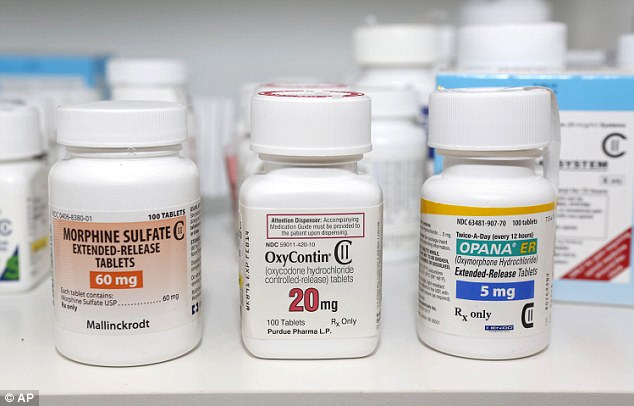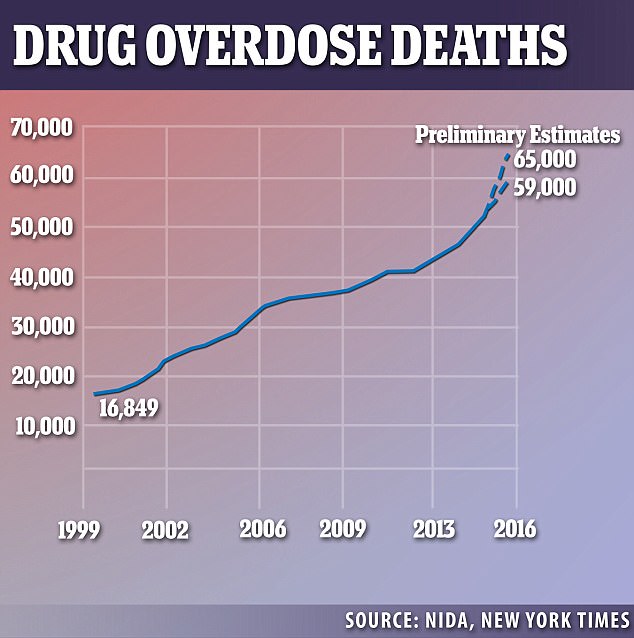…first time amid drug addiction epidemic.

Endo Pharmaceuticals received an FDA warning on Thursday to remove Opana ER from the market. It’s the first time US regulators have asked for a firm to discontinue an opioid painkiller
The FDA has ordered a drugmaker to stop selling a narcotic painkiller that was blamed for an outbreak of HIV, hepatitis C and drug overdoses in the Midwest.
Endo Pharmaceuticals received an official warning on Thursday to remove Opana ER from the market.
It is the first time US regulators have asked for a firm to discontinue an opioid painkiller.
But it comes at a crucial point in the country’s drug addiction crisis: new figures released this week by the New York Times revealed drug overdoses are now the leading cause of death in American adults under 50.
Opana ER was first approved in 2006 to treat moderate-to-severe pain for an extended period of time.
In 2012, amid fears of addiction, Endo released a reformulated, extended-release version, which was meant to be an abuse-resistant drug.
The new version was designed in such a way that it would be more difficult to inject or snort it.
However, while the new product met the regulatory standards for approval, the FDA said that the data was not enough to show that it could meaningfully reduce abuse, and refused to let the company to market it as non-addictive.
Now, regulators say all the evidence they have collected in the five years since shows the reformulated version still carries a very high risk of addiction and abuse.
The FDA says it has seen a ‘significant shift’ from people crushing and snorting Opana ER to get high to injecting it.
Abuse of Opana ER was blamed for a 2015 outbreak of HIV and hepatitis C in southern Indiana linked to sharing needles.
The move comes three months after an FDA advisory committee meeting, in which a group of independent experts voted 18-8 that the benefits of reformulated Opana ER no longer outweigh its risks.
The FDA has issued a letter to the company, urging them to voluntarily remove reformulated Opana ER from the market.
If Endo does not comply, the FDA will to take steps to formally remove it from the market. Endo officials did not immediately respond with a comment.

Data from the Times shows drug overdose deaths surged 19 percent to at least 59,000 in 2016
The warning comes just two days after the New York Times published preliminary CDC data that show drug overdoses are the leading killer of adults under 50 in the US – killing more in a year than were ever killed annually by HIV, gun violence or car crashes.
The data, published in a special report by the Times’ Josh Katz, lays bare the bleak state of America’s opioid addiction crisis fueled by deadly manufactured drugs like fentanyl.
The figures are based on preliminary data, which will form part of an official report by the CDC later this year.
Experts warn a key factor of the surge in deaths is fentanyl, which can be 50 times more powerful than heroin.
The Times said its data showed between 59,000 and 65,000 people could have died from overdoses in 2016, up from 52,404 in 2015, and double the death rate a decade ago.
‘And all evidence suggests the problem has continued to worsen in 2017,’ the Times said.
Researched and written by Mia De Graaf for The Daily Mail ~ June 8, 2017.
 FAIR USE NOTICE: This site contains copyrighted material the use of which has not always been specifically authorized by the copyright owner. We are making such material available in our efforts to advance understanding of environmental, political, human rights, economic, democracy, scientific, and social justice issues, etc. We believe this constitutes a ‘fair use’ of any such copyrighted material as provided for in section 107 of the US Copyright Law. In accordance with Title 17 U. S. C. Section 107, the material on this site is distributed without profit to those who have expressed a prior interest in receiving the included information for research and educational purposes. For more information go to: http://www.law.cornell.edu/uscode/17/107.shtml“
FAIR USE NOTICE: This site contains copyrighted material the use of which has not always been specifically authorized by the copyright owner. We are making such material available in our efforts to advance understanding of environmental, political, human rights, economic, democracy, scientific, and social justice issues, etc. We believe this constitutes a ‘fair use’ of any such copyrighted material as provided for in section 107 of the US Copyright Law. In accordance with Title 17 U. S. C. Section 107, the material on this site is distributed without profit to those who have expressed a prior interest in receiving the included information for research and educational purposes. For more information go to: http://www.law.cornell.edu/uscode/17/107.shtml“
